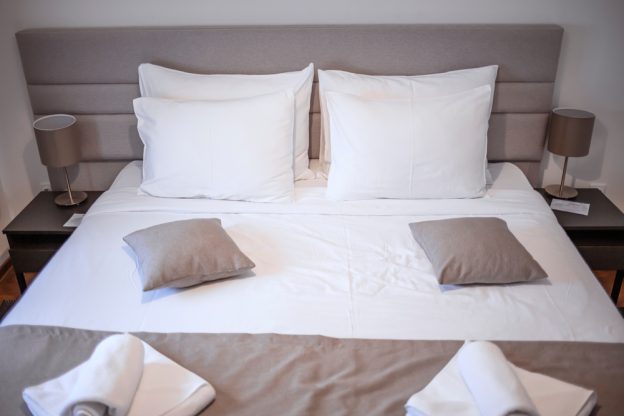In our previous blog; we have touched upon the importance of getting your full 8 hours of sleep a night. From generally improving cognitive functions to surprising aesthetic differences, there are many reasons to improve your sleeping pattern.
Whilst there is no simple way to maximise your cheap leather bed (using just one example) ready the perfect night sleep, there are some clinically proven methods to help you get a better night sleep.
One of the most effective ways to do this is by meticulously preparing for the perfect night sleep.
Waking Up In The Correct Manner
Whilst many believe preparations for the best night sleep start only an hour or so before bed; the true preparations start as soon as you wake.
You actually awake from sleep much easier if you construct your room in a way that makes waking up more easier.
Pay particular attention to how far your alarm is. If you have to physically get out of bed to turn the alarm off, you might find this rather annoying especially if you are still slightly in the slumper of awakening. To counteract this; you might want to position your alarm clock within arms length.
Or, you might want to invest in an alarm that can be turned off via voice control. By doing this, you will not need to get out of the comfort of your bed or fumble around trying to locate your buzzing alarm.
Waking up in the morning can have a drastic impact on how you are prepared for the days activities and even the quality of sleep you get that night.
Perform Daily Activities Which Will Tire You
Preparations for sleep should subconsciously be carried out throughout the day. You should perform tasks or activities that gradually tire you out. Whilst this not only improves your productivity during the day; it helps rest much easier at night.
It is helpful to participate in some exercise or even perform other physical tasks such as cleaning.
Whilst mentally tiring tasks can make you feel tired, studies have found that it does not encourage your body to get a good night’s sleep the way physical activities do.
It is a fine balancing act. Do not overwork yourself. This can lead to fatigue throughout the day and can actually be a detriment to your sleep rather than a helpful advantage.
Set a Time And Stick To It
Many experts advise you should establish a set time to go to sleep. Habits are one of the most authentic ways to ensure you get the perfect 8 hours of sleep.
Choosing a selective window to fall asleep in can be potentially problematic. There are numerous ways to counteract this though. Mould the sleeping pattern around your daily schedule. If you need to be at work for 9am and you normally wake up at 7, you can go to sleep as late as 11.
This can be perfected through trial and error. You might find you prefer going to bed later and waking up later or vice versa. It is of paramount importance to find a pattern that suits you and your busy lifestyle.
Limit Caffeine Before Bed
Now you have a set sleeping schedule, you know which time to avoid caffeine from. It is recommended that you should stop drinking caffeine 4 to 6 hours before going to sleep.
Caffeine is obviously a stimulant. Excessive consumption of caffeine can lead to irritability and, more importantly in regards to this list, struggles getting to sleep.
You should also monitor your general caffeine over the course of your day. Frequently consuming a lot of coffee or tea can lead to alertness for a time but once the effects of caffeine wear off, it can actually make you more tired than usual.
Relax Your Mind
Relaxing your mind in anticipation of sleep is easier said than done. There is no set science for putting your mind in a position to carefully away into REM. However, you can try one of the below techniques that have worked for other eager sleep junkie:
- Listen to relaxing music before bed
- Brush your teeth
- Control How Much Food You Have (You don’t want to wake up hungry but if you are too full you might feel sick)
- Drink Water (But not too much)
- Switch Off Your Phone Well Before Bed
- Avoid Screens (Unless you are watching something that relaxes you)
Tidy Your Bed Before Hand
They say a tidy room is a tidy mind. If this common saying rings true then having a clean and tidy room can help to clear and prepare your mind.
If this is the case; you might want to make your bed, put away any clutter and organise your room so everything is easily accessible and aesthetically pleasing.
Still Need Help Getting to Sleep?
If you still need help getting to sleep, do not hesitate to contact us. You might be in need of some new sleeping arrangements. At UK Bedstore, we have got you covered. From fresh double bed frames to stylish metal beds, we will have something for you.

